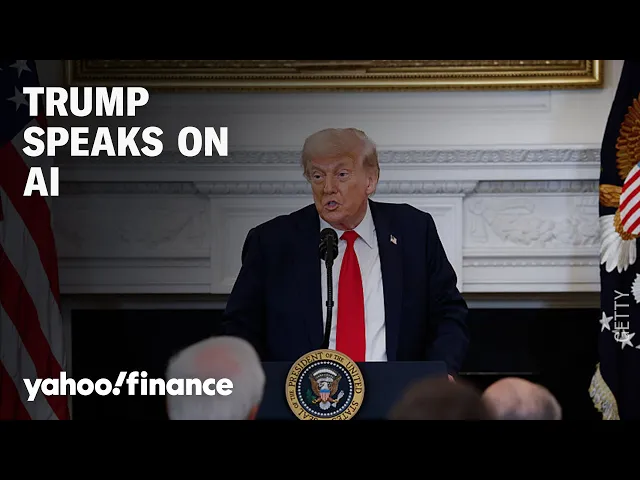President Trump delivers remarks on AI

Trump shifts course on AI regulation
The former president known for deregulation now signals a surprising policy reversal on artificial intelligence governance. Donald Trump's recent speech reveals his campaign's emerging strategy on technology oversight, potentially transforming the regulatory landscape if he returns to office.
Trump's remarks on AI represent a significant departure from his previous administration's hands-off approach to tech regulation. Speaking to supporters, he outlined a vision that balances innovation with newfound concerns about AI's societal impacts—particularly regarding job displacement, election interference, and national security. This pivot comes as AI development accelerates and public anxiety grows about uncontrolled technological advancement.
Key insights from Trump's AI address:
-
Trump is advocating for a comprehensive regulatory framework for AI that includes safety testing, legal liability, and consumer protection mechanisms—a stark contrast to his earlier deregulatory stance.
-
He specifically highlighted concerns about AI replacing American workers, potentially undermining elections, and creating convincing deepfakes that could manipulate public opinion.
-
The speech positioned China as America's primary technological adversary, framing AI development as a critical national security matter requiring government intervention.
The surprising policy reversal
The most revelatory aspect of Trump's speech is his embrace of regulatory oversight for an emerging technology. This marks a dramatic departure from his first administration's approach, which prioritized removing regulatory barriers across industries. During his 2017-2021 presidency, Trump frequently championed deregulation as a catalyst for economic growth, signing executive orders requiring agencies to eliminate two regulations for every new one created.
This shift reflects the changing political calculus around technology governance. As AI capabilities grow exponentially, concerns about its uncontrolled development have transcended traditional partisan divides. Even the tech industry itself—typically resistant to oversight—has called for thoughtful regulation of advanced AI systems. Trump appears to be responding to this shifting consensus while attempting to distinguish his approach from the Biden administration's executive order on AI.
Contextualizing Trump's AI stance
What Trump's speech doesn't acknowledge is that his proposed regulatory framework shares significant similarities with initiatives already underway. The Biden administration has implemented an executive order requiring safety testing for powerful AI systems and establishing federal guidelines for responsible AI development. The European Union has passed the comprehensive AI Act, creating a tiered regulatory approach based on risk levels.
Trump's speech positions his regulatory vision as uniqu
Recent Videos
How To Earn MONEY With Images (No Bullsh*t)
Smart earnings from your image collection In today's digital economy, passive income streams have become increasingly accessible to creators with various skill sets. A recent YouTube video cuts through the hype to explore legitimate ways photographers, designers, and even casual smartphone users can monetize their image collections. The strategies outlined don't rely on unrealistic promises or complicated schemes—instead, they focus on established marketplaces with proven revenue potential for image creators. Key Points Stock photography platforms like Shutterstock, Adobe Stock, and Getty Images remain viable income sources when you understand their specific requirements and optimize your submissions accordingly. Specialized marketplaces focusing...
Oct 3, 2025New SHAPE SHIFTING AI Robot Is Freaking People Out
Liquid robots will change everything In the quiet labs of Carnegie Mellon University, scientists have created something that feels plucked from science fiction—a magnetic slime robot that can transform between liquid and solid states, slipping through tight spaces before reassembling on the other side. This technology, showcased in a recent YouTube video, represents a significant leap beyond traditional robotics into a realm where machines mimic not just animal movements, but their fundamental physical properties. While the internet might be buzzing with dystopian concerns about "shape-shifting terminators," the reality offers far more promising applications that could revolutionize medicine, rescue operations, and...
Oct 3, 2025How To Do Homeless AI Tiktok Trend (Tiktok Homeless AI Tutorial)
AI homeless trend raises ethical concerns In an era where social media trends evolve faster than we can comprehend them, TikTok's "homeless AI" trend has sparked both creative engagement and serious ethical questions. The trend, which involves using AI to transform ordinary photos into images depicting homelessness, has rapidly gained traction across the platform, with creators eagerly jumping on board to showcase their digital transformations. While the technical process is relatively straightforward, the implications of digitally "becoming homeless" for entertainment deserve careful consideration. The video tutorial provides a step-by-step guide on creating these AI-generated images, explaining how users can transform...
